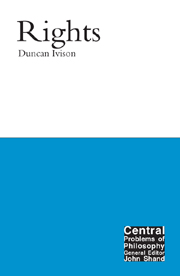3 - Rights as property
Summary
Rights are not fruitfully conceived as possessions. Rights are relationships, not things; they are institutionally defined rules specifying what people can do in relation to one another. Rights refer to doing more than having, to social relationships that enable or constrain action.
(Young 1990: 25)Introduction
One familiar way of making sense of rights is to think of them as related to control over our property and ourselves. This intuition lies behind the attractiveness of the “choice” theory of rights that we discussed in Chapter 1. In this chapter, I want to take a closer look at this way of understanding rights, which also has interesting connections with the natural law tradition, which we have been discussing in Chapter 2. Central here is the notion of self- ownership; I “own” myself in the sense that no one else has the right to use my body, or control my choices, unless I consent. What is striking about this idea is how it has been central to a range of different political ideologies and traditions. Libertarians take it very seriously, but so too do Marxists and egalitarian liberals. A central theme of this chapter is the way conceptions of the self inform and shape our conceptions of rights. The normative idea of self- ownership points to a set of ways of thinking about what is most distinctive or significant about human beings and why they should have rights.
- Type
- Chapter
- Information
- Rights , pp. 62 - 93Publisher: Acumen PublishingPrint publication year: 2007

